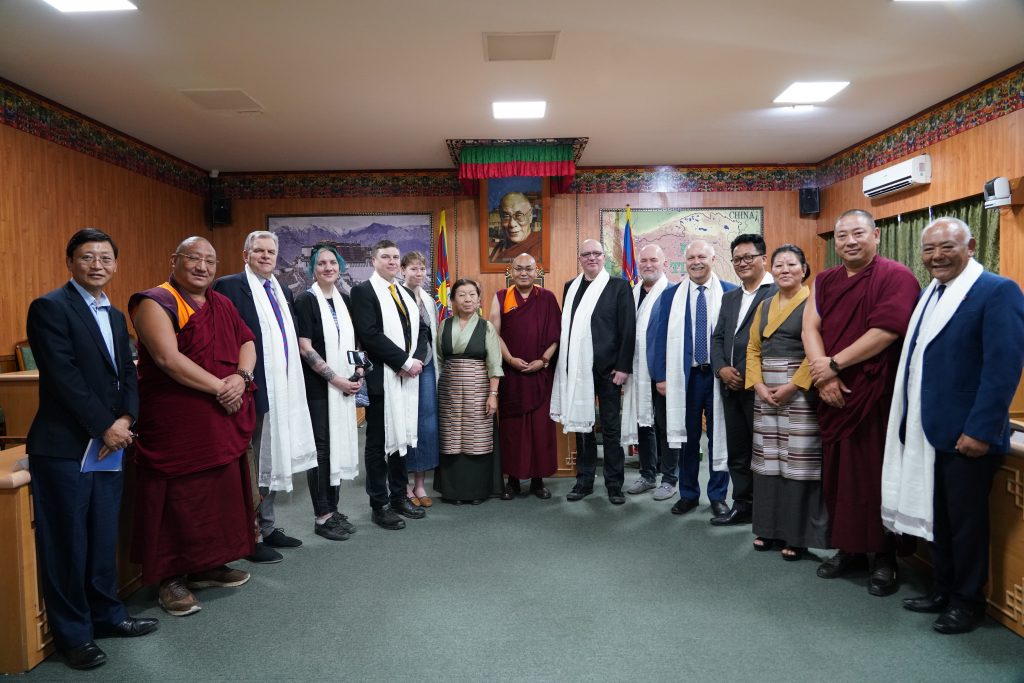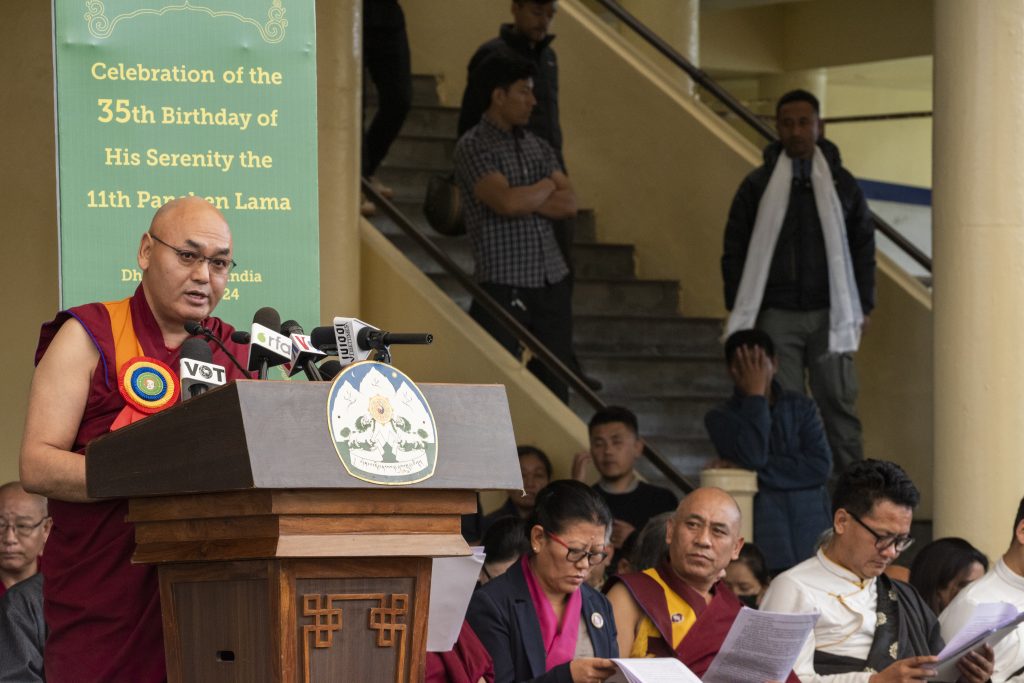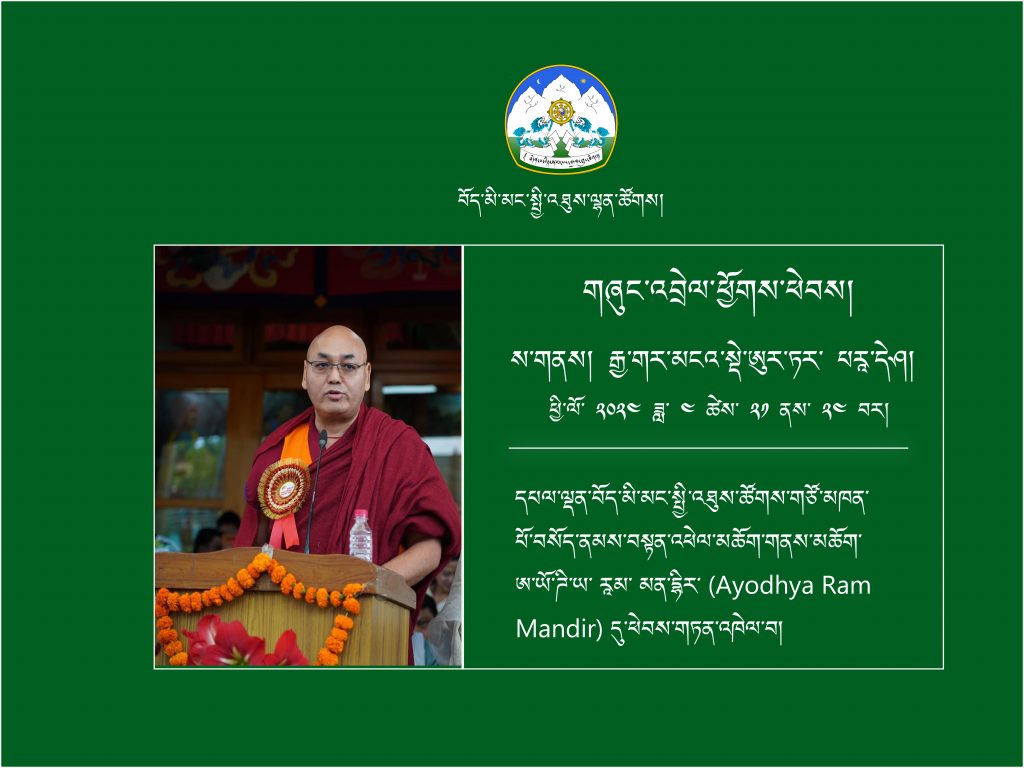
Mcleod Ganj, Dharamsala: Deputy Speaker of 16th Tibetan Parliament-in-exile Ven. Acharya Yeshi Phunstok attended the closing day of Central Council of Tibetan Medicine (CCTM) 30th Board Meeting as ‘Chief Guest’ in accordance to the invitation proffered by the same at Hotel Tibet, Mcleod Ganj on Sept 8.
Beside Deputy Speaker, the panelists at the meeting included Yeshi Wangmo, Additional Secretary, Department of Health (CTA), Dr. Tsewang Tamdin, Chief Medical Officer, Tibetan Medical and Astrological Institute (TMAI), Dr. (Prof) Lobsang Tenzin Rakdoh, Chairman, CCTM and Dr. Penpa Tsering, Executive member, CCTM.
After the presentation of annual reports and appreciation certificates to the participants as well as the resource persons of the Sixth Continuing Medical Education (CME), Deputy Speaker addressed the participants.
While recounting his past participation as the Sowa-Rigpa Committee of Tibetan Parliament-in-Exile, he stated that it is because of the establishment of CCTM that many people are becoming more aware of the rich tradition of Sowa-Rigpa (Tibetan medical system). He also recounted how Sh. Jagat Prakash Nadda, the Union Minister of Health and Family Welfare appraised the Tibetan medical system and lauded Dr. Yeshi Dhonden, a Sowa-Rigpa practitioner and the Padma Shree awardee.
‘All the traditional ten cultural fields of knowledge (Rigney) of Tibet, inclusive of both major and minor, are important. In exile, the most prominent, out of the 10, are Inner Science (Nang-don Rigpa), the Science of Healing (Sowa- Rigpa) and Drama (Doegar) as can be discerned from the notable recognition of Tibetan Buddism, Tibetan medical practices and Tibetan opera and dance respectively. With the eradication of our valued traditional knowledge and sciences in Tibet, it is very important that we preserve, promote and disseminate all the ten cultural fields of knowledge here. As medical practitioners, you all meet hundreds of patients each day. It would be worthwhile to introduce them to the Tibetans unique fields of knowledge as well,’ said the Deputy Speaker.
He also counseled them to be self-reliant in order for the establishment to be stable. He said,’These days, unfortunately, economical factor contributes a lot to the stability of an establishment. However, you must not rely solely on the economic factor. The registered medical practitioners must shoulder the responsibility of the stability of the establishment.’
He further delineated various ways to approach for assistance, if needed be, before the last minute, for a successful and effective CCTM. Such as reaching out to Tibetan Parliament-in-exile for any amendments related to the rules and regulations in Sowa-Rigpa and reaching out to the state and central government of the host country, India, for any special assistance. He also advised them to branch out more in different Buddhist institutes in various states and to approach others to learn from them without any inhibitions.
‘After studying one of the major cultural field of knowledge, i.e., Science of Healing (Sowa-Rigpa), it is only natural to preserve, perpetuate and use it for one’s sustenance. However, its entity should not be converted into a competitive commercialism. The sublimity of this tradition is the fact that there has not been any case of medical or prescription error. Along with the medical practices, you all must strive hard to promote and disseminate traditional Tibetan astrological practices (Kartsi – one of the minor Tibetan cultural field of knowledge) as well. As the establishment evolves, you are bound to face different opinions but one must look at them as constructive criticism and use them to further the establishment’s development. In addition, it is equally important to respect and cherish the senior medical practitioners as time goes by, for, respecting others does not lessen one’s esteem but rather gains equal respect,’ said the Deputy Speaker.
He concluded his address by stating that, ‘As a refugee depending on others in exile for the last 59 years, while the Tibetans inside Tibet suffers incessantly and self-immolates and with the Chinese government planning to build three more airports in Tibet and a railway link from Tibet to Kathmandu, Nepal, it is our utmost responsibility as a Tibetan to disseminate to the world about Tibetan struggle and out just cause. To the non-Tibetan practitioners and members of CCTM from Himalayan region, we share the same script and religion and therefore, it is only just that you assist in preserving and perpetuating our shared culture and tradition. The world can only benefit from helping us, for we have a lot more to offer and contribute.’
Thereafter, he thanked the CCTM for the invitation on behalf of Standing Committee of the Tibetan Parliament-in-exile and expressed his hope that his address could be of some benefit to the participants.
The conference concluded with Chairman of CCTM Dr. (Prof) Lobsang Tashi Rakdoh and Executive Committee, Dr. Penpa Tsering reading out the press releases of the 30th Board Meeting of CCTM.
The 30th Board Meeting of CCTM was held from Sept 3-7, concurring with the 6th Continuing Medical Education on Sowa-Rigpa from Sept 3 to 8, funded by AYUSH, the government of India at Hotel Tibet, McLeod Ganj. This time, the board meeting had passed seven resolutions.





